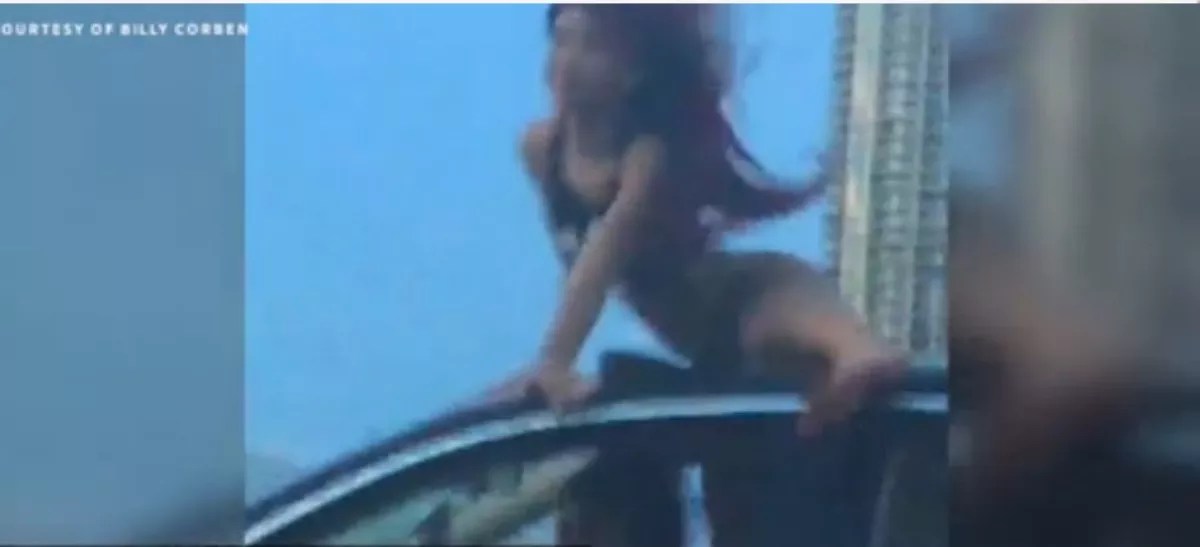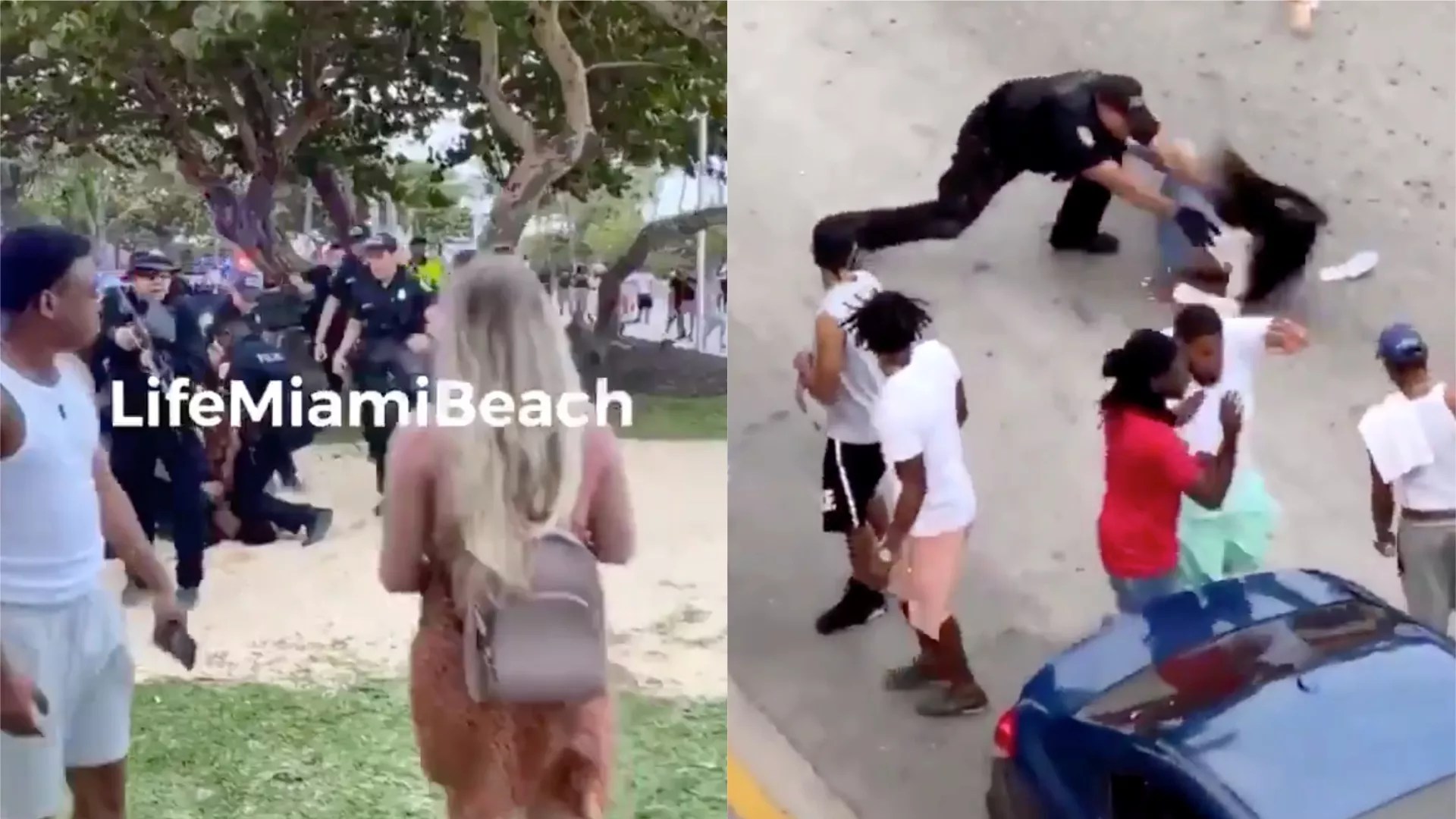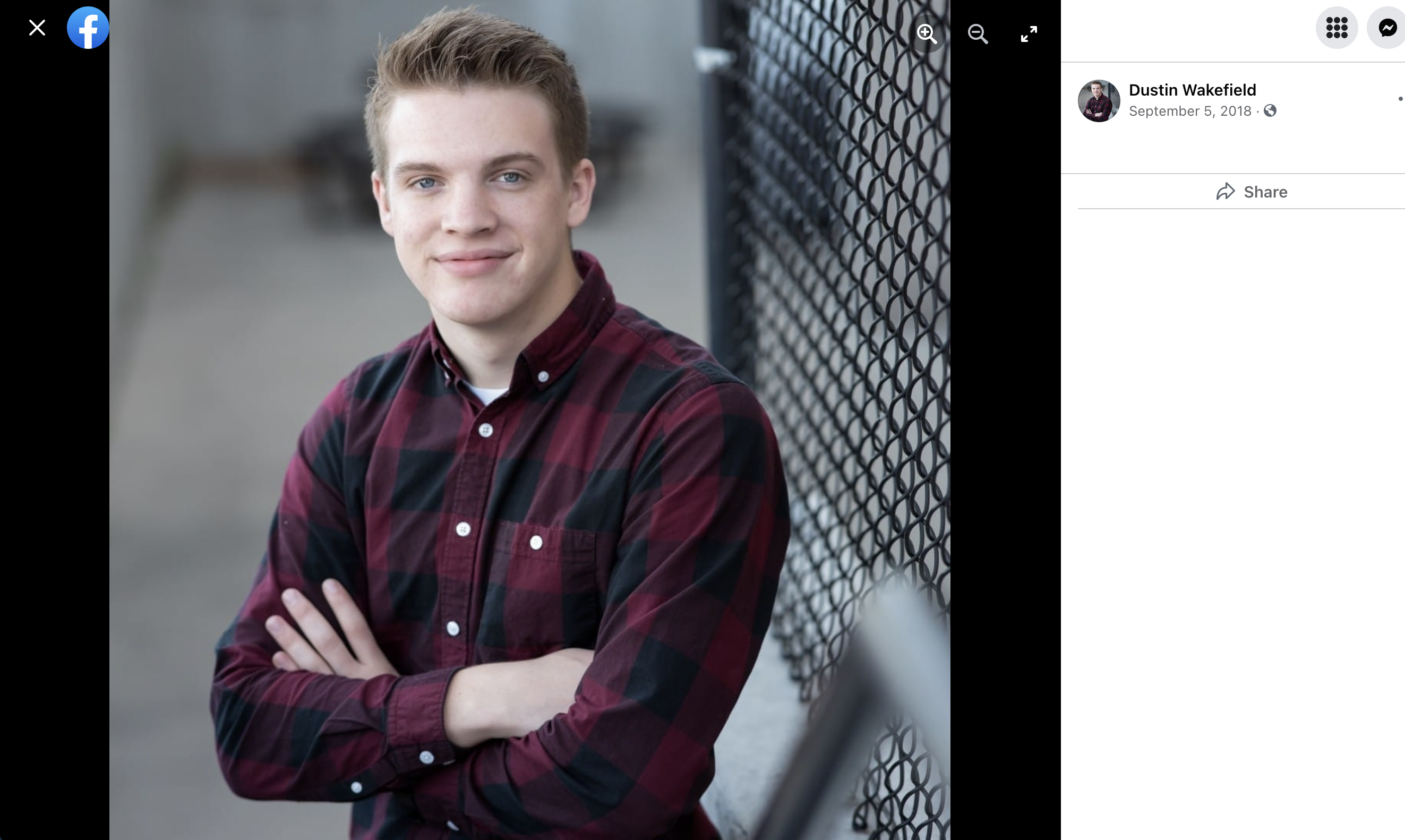
Photo by George Martinez

Audio By Carbonatix
Ah, spring break in Miami Beach. A magical time that comes with all the clichéd trappings of a classic vacation movie: sun, surf, tropical drinks.
That is, until the police occupation and violent shootouts.
This week, the City of Miami Beach declared a state of emergency during spring break for the second year in a row following multiple shootings, injured police officers, and throngs of spring breakers taking over the streets, spurring city leaders to all but shut down the barrier island after midnight beginning this Thursday, March 24.
Has spring break in Miami Beach always been this unhinged?
Well, there’s no shortage of wacky and disturbing headlines from Miami Beach – particularly the South Beach entertainment district – over the years.
Here, we’ve compiled five of the most out-there Miami Beach incidents from years past.

via New Times video
Twerking at Full Throttle
Twerking on top of cars has become a titillating and dangerous spring break tradition, but few gyrating champions have exhibited the agility of the 2017 twerk queen who took booty-shaking to a new, high-speed level.
In a video posted to Twitter by filmmaker Billy Corben on March 14, 2017, a red-haired woman can be seen splayed atop a moving vehicle as it speeds along the MacArthur Causeway, shaking what her mama gave her. At one point, the woman puts her hands in her hair while still throwing it down on the car’s roof as it remains in motion. The death-defying act earned her the respect of observers on social media, who compared her to a superhero.
If she is a hero, she’s the one Miami deserves but maybe not the one it needs right now.

Ultra Music Festival 2018
Photo by George Martinez
Miami Beach’s Anti-Tourism Campaign to College Kids
With its worldwide reputation as a party spot, Miami Beach has seen a flood of tourists during spring break for years. So much so, in fact, that Miami Beach city officials tried in 2018 to pre-emptively prevent college students from coming to their city for some fun in the sun.
In advance of the 2019 spring break season, then-Miami Beach police chief Daniel Oates sent letters to college administrators and fraternity and sorority presidents telling them to keep their kids in check – or else.
“I am writing to ask that you assist Miami Beach in sharing with your students the following message from our police department: ‘If you come to Miami Beach for spring break, you must obey our laws. If you do not, you will be arrested,'” Oates wrote to university leaders.
This followed a 2018 spring break when so many tourists flocked to Miami Beach that the city closed off the MacArthur Causeway and refused to let anyone else in.

The videos of police have since gone viral.
Screenshots via Life Miami Beach, ThighPadJay / Instagram
Pandemic Parties Meet Racial Outrage
While much of the rest of the nation was sheltering in place during early pandemic lockdowns in March of 2020, Florida made it clear that Miami Beach was still open for business.
Shockingly, the “rules are for fools” philosophy turned out to be a recipe for disaster, as thousands of spring breakers eager for an outdoor outlet descended on South Beach for a good time – COVID-19 be damned.
But it wasn’t the overly congested roadways or the super-spreader potential that was the biggest concern. It was the disproportionate riot-style police violence directed at Black partygoers.
Some videos showed Miami Beach police officers firing off pepper bullets into a crowd of mostly Black men and women. Another video surfaced of a white police officer running toward a Black woman at full speed, tackling her to the ground, grabbing her by the neck, and repeatedly slamming her into the pavement.
At the time, the Miami-Dade chapter of the NAACP called for the immediate resignation of police chief Richard Clements and said they’d “had enough” of the department’s selective enforcement against Black people.
Clements remains the seaside municipality’s top cop and watchdogs still claim his department has a bad habit of targeting racial minorities during high-traffic times, including spring break.

Christine Englehardt was drugged, raped, and found dead in a Miami Beach hotel.
Graphic courtesy of Nick D’Annunzio
Springtime Predators
Maybe it’s the combination of glaring heat, tightly packed bodies, and easy access to illicit substances, but something about springtime in Miami Beach brings out Miami’s vice in.
On March 18, 2021, 24-year-old Christine Englehardt was found dead in her room at the Albion Hotel. Englehardt, who had traveled to Miami from Pennsylvania for spring break, was found to have died partly from lying in a prone position while under the influence of fentanyl and alcohol.
Miami Beach police arrested two men, Evoire Collier and Dorian Taylor, and charged them with sexual battery, burglary, battery, and theft. Police alleged that Collier and Taylor took Englehardt to the hotel room, drugged her, and sexually assaulted her before stealing her cell phone and credit cards. Collier confessed to police that he and Taylor had given Englehardt a “green pill,” which a medical examiner determined to be fentanyl – consistent with what the medical examiner concluded from the autopsy.

Dustin Wakefield, 21, was killed in a random attack on Ocean Drive in August 2021
Screenshot via Facebook
Mushroom Panic
Though the incident occurred in August 2021 – i.e., not during spring break – it nonetheless ignited the tourist-induced paranoia. Dustin Wakefield, a 21-year-old visiting from Colorado, was sitting quietly at La Cerveceria de Barrio on Ocean Drive when another tourist, Tamarius Davis, walked up to him in broad daylight and shot him dead. Police quickly caught up with Davis – the incident was caught on camera – who informed officers he was high on “magic mushrooms” that “made him feel empowered.”
Shortly after the shooting, Miami Beach City Commissioner Ricky Arriola took to Facebook to express his disapproval of hallucinogenic mushrooms, which he erroneously described as a “powerful narcotic.” Though the psychoactive effects of mushrooms almost never lead to violence, Davis’ comment about magic mushrooms was enough to set off a brief psychedelic panic on Miami Beach.